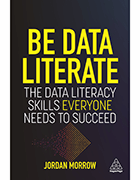
Getty Images
Harness the power of data literacy through democratizing data
Author Jordan Morrow weighs in on enterprise strategies to improve democratizing data through expanded use of BI and augmented analytics.
To maximize the benefits of data for users, enterprises continue to build business intelligence and augmented analytics capabilities.
Continued advancements in these areas are vital to make data accessible to the widest pool of users in an enterprise. Jordan Morrow, author of Be Data Literate, refers to this as the "democratization of data." This process of democratizing data is achieved through data literacy.
In his book, Morrow breaks down data literacy, analytics and strategy to explore how everyone can harness the power of information in an increasingly data-driven world.
Your book discusses the importance of democratizing data. What are the benefits of this for an enterprise?
Jordan Morrow: Democratizing data puts data into the hands of others. This should allow more eyeballs to be on the data looking to find insights and trends. The reality is, though, that democratization of data should provide a widespread and diversified set of voices toward the data, giving different perspectives and more ability to make better decisions with data.
Unless it is coupled with data literacy, then democratizing may not amount to much. The majority of people do not have a background in data, so just democratizing it won't bring those solutions. There needs to be data literacy learning, too.
How do advancements in BI impact data democratization strategies for an organization?
 Jordan Morrow
Jordan Morrow
Morrow: These advancements should empower data democratization strategies for an organization. BI tools and technologies are making it so we no longer need to spend hours and hours building and such within the BI tool. Instead, now the tool can do some of that work for the end user. This is especially empowering because the data literacy skills may not be as strong, so a tool that augments and enables is empowering. Now, the different voices and minds in the organization can utilize the tool to help them with data-driven decisions.
How can an organization make it easier to make data accessible for its users, particularly those who are not as well versed in BI or analytical systems?
Morrow: The key to making data accessible is to have a strong data strategy and data literacy workflow. Making data accessible isn't necessarily the answer because it can overwhelm people. Strategically making data accessible is the right approach. So, having a determined strategy and desired outcome allows the organization to flow data through the workforce to receive results. This allows the organization to build strategic investments in BI tools that work toward specific ends. Then, you make the data accessible to answer the needs of the organization and through the end users who have had data democratized to them.
How can AI, machine learning or embedded analytics relieve additional responsibilities from the user?
Morrow: I love the advancements of technologies. These new technologies now can remove some of the mundane work that was built into the work of data and analytics. For example, imagine a dashboard or visualization that used to take a few hours to complete. With advancing technologies, it now may take considerably less time overall. This empowers the individual to not necessarily spend time building but instead analyzing and interpreting. Giving them more insight, that is the key. The new technologies can relieve some of the building and turn it into insight-driven work.
Where do you see the future of BI, analytics and strategies of democratizing data trending going forward?
Morrow: I see them expanding more and more. The reality is technologies advancing will empower better analytics, better strategies and empower democratizing data. The reality is, though, you have to have strong data literacy, or all of these things could be for naught.







